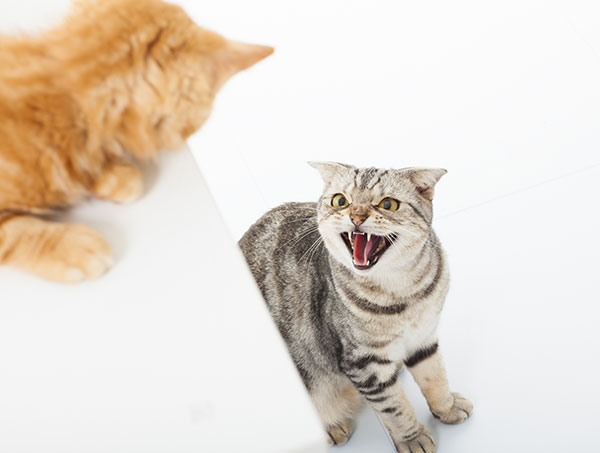If you own multiple cats or live in neighborhoods where cats freely prowl the streets, you might have realized that the animals tend to get into fights at night.
In most cases, you won’t even need to be out of bed to catch the actual catfights. You can always tell that cats are fighting in your house or backyard by listening to their guttural meowing, hissing, growling, and screeching sounds. Depending on how intense the fights are, you’ll also hear them racing across the house or compound.
As a concerned pet parent, it’s natural to find yourself wondering, why do my cats fight at night?
The primary reason cats fight at night is that cats are nocturnal (well, technically crepuscular) animals. Therefore, they’re more active at night than during the day. Since your feline friend’s activity peaks at night, it also means that this is the time he interacts more with other cats.
And considering that cats are not exactly social animals, they don’t get along in larger packs. So, they may get into fights for a number or reasons, ranging from territoriality to mating rights, food, to mention but a few. In rare cases, catfights may also be triggered by underlying medical conditions or behavioral disorders.
Read on as we uncover all the possible reasons cats fight at night. The article shall also explore some of the tips you can implement to prevent your cats from getting into night fights.
Table of Contents
Why Do My Cats Start Fighting At Night?
You own two or more cats that seem to get along pretty well during the day. But for some reason, nightfall often marks the beginning of unexplained animosity between the animals.
Any cat owner in your situation would wonder, ‘my cats are friends during the day but fight at night, what could be the problem?’
As we’ve already highlighted, cats are nocturnal animals – active at night. It’s during the night that cats are likely to go on the prowl as well as hone their hunting skills. Since this is the time that cats also interact with one another, it makes sense why most catfights happen at night.
View this post on Instagram
So, why do my cats only fight at night?
The most plausible explanation why your cats only fight at night is that this is the time they’re most active; hence, more likely to interact with each other.
But as you might have noticed, catfights typically don’t last the entire night. They’re mostly concentrated around dawn and dusk. That’s because this is the part of the night where cats are most active. Animals that are active around dawn and dusk are said to be crepuscular.
Another thing worth noting is that the annoying sounds cats make at night do not necessarily indicate that they’re fighting. It takes a decent amount of confrontation for the domestic cat to go on an all-out fight. The deep meowing, hissing, and growling sounds you hear are primarily meant to warn the other cats to leave. Fights only ensue if these warnings go unheeded.
Lastly, it’s important to emphasize that indoor cats generally fight for different reasons than feral or stray cats. The following sections expound more on that.
Why Do My Indoor Cats Fight At Night?
The following are common reasons indoor cats get into night fights;
1. Dominance
Not only do indoor cats establish their social hierarchy in the household. They’re also known for defending their positions within the family pecking order.
Most cats place their owners as well as other human members of the household high up in the family hierarchy. That explains why cats are unlikely to get into dominance fights with kids, however young. The problem usually arises when cats try to establish hierarchies within themselves.
View this post on Instagram
If you own multiple cats, there will always be a leader of the pack. However, the leader can be deposed at any time, and usually without warning.
But during these violent regime changes, the reigning cats usually don’t go down so easily. In fact, superior cats will readily go on the offensive as soon as they suspect their dominance is threatened.
Various reasons may trigger dominance squabbles among cats. The most common one is routine changes.
2. Maternal Aggression
Maternal aggression is common among overprotective mother cats. It generally happens when other cats approach the mother cat’s kittens.
Fearing for her vulnerable young, the nursing mom will not hesitate to ward off the threat.
Note that a mother cat’s protective instincts can kick in even if the intruder happens to be a cat she typically gets along with.
Fortunately, this form of aggression usually goes away shortly after the kittens are weaned.
3. Play Aggression
Cats have a notorious reputation for playing rough. When they play, they typically stalk, ambush, chase, and pounce on one another.
They may even take a swipe at each other, inflicting vicious bites and scratches. And that’s where the problem normally starts.
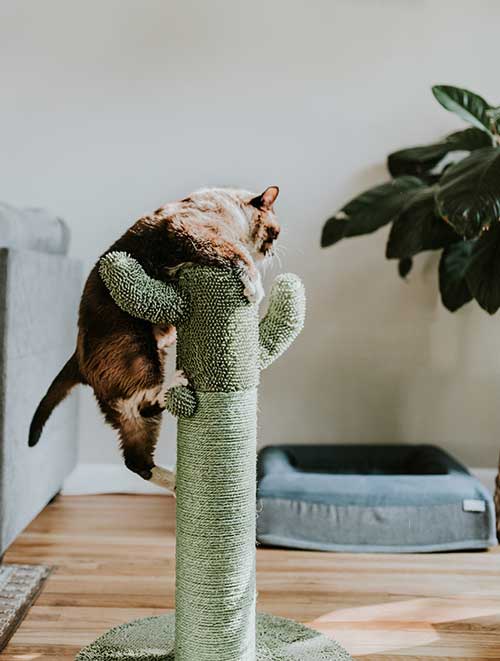
Some cats may not take kindly the bites or scratches inflicted on them in the course of their playtime. They might interpret these innocent acts of aggression as a challenge for an all-out fight.
What complicates the situation even further is that rough play has a way of stimulating cats. That’s especially true where there are significant age differences between the players.
4. Fear Aggression
Fear aggression is common among cats with sketchy behavior and personality. For instance, cats that are jumpy, jittery, nervous, or skittish are more likely to enter into catfights than their calmer and less temperamental counterparts.
That’s because these sketchy behaviors may trigger predatory instincts.
When one cat suddenly jumps and dashes across the house, the other unassuming cats may go after him. And fearing for his life, the skittish cat might turn back and attempt to defend himself, resulting in a fight.
- 【WELCOMES LARGER OR CHUBBY CATS】With a widened cat perch at 17.7” x 11.8”, larger or chubby cats can finally stretch...
- 【2-IN-1 SCRATCHING RAMP】With a scratching board and a ladder in one, this cat scratcher not only lets your cats scratch to...
- 【2-DOOR CAT CAVE, 2 BENEFITS】Designed with 2 doors, this cat cave lets your cat easily get in and out or go to the fluffy cat...
Last update on 2025-02-07 / Affiliate links / Images from Amazon Product Advertising API
5. Natural Aggression
Some cats are naturally aggressive. Male cats are particularly aggressive and will get into a fight at the slightest provocation.
Their overbearing nature causes them to get into fights more often than their female counterparts. And they don’t really care who they pick a fight with, whether it’s a sibling, their parent, or a strange cat.
So, why do male cats fight at night?
The main reason male cats fight at night is that they’re highly aggressive by nature.
Still on natural aggression, it’s worth noting that cats are not social animals. They’re more at home living alone, in mating pairs, or in otherwise very small packs. When there are too many of them in one house, fights will invariably ensue.
Sometimes they’ll fight to establish dominance. But other times, they’ll simply fight for the heck of it.
View this post on Instagram
Why Do Stray Cats Fight At Night?
1. Unfamiliarity
Unfamiliarity is one of the main reasons most stray cats enter into fights with one another at night.
As stray cats prowl the neighborhood at night, they invariably come into contact with other cats equally on the prowl.
Remember that cats are not social animals. So, when unfamiliar cats meet, they’re more likely to confront each other than get along.
2. Territoriality
Cats are fiercely territorial animals and will not hesitate to defend their turf from marauding invaders.
In most cases, a quick spat is all it takes to ward off the trespasser. But there’s usually no guarantee that the intruder will leave so fast.
At times, he might choose to stand his ground and lay claim to the new turf. Determined to keep his territory, the resident cat will likely go on the offensive.
Territorial fights can be difficult to avoid considering that cats can lay claim to a fairly large area. Their territories can range from the area around the perimeter of a house to the whole compound. Some cats may even lay claim to the entire neighborhood.
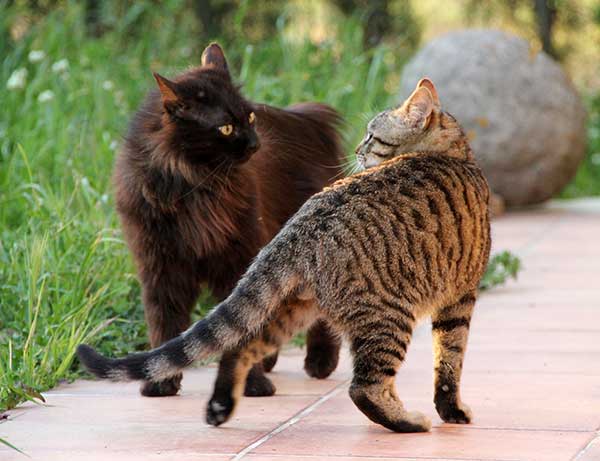
3. Hunting
Stray cats are largely independent and don’t rely on humans for foods. They obtain much of their food from hunting rodents and reptiles, or from scavenging trash cans.
Now, cats are solitary hunters. They prefer stalking, ambushing, or running down their prey by themselves.
But in the course of their hunting, stray cats may encounter other cats. These encounters could turn violent as both cats try to eliminate competition for prey.
4. Food
Feral cats are excellent hunters. But they also don’t mind stealing food from one another whenever an opportunity presents itself.
After successfully hunting down their prey, a cat will look for a secure spot to enjoy his dinner. In the process, he might encounter other cats keen on stealing his food.
Of course, the successful hunter won’t sit back and watch his dinner slipping out of his paws.
5. Mating Rights
Stray cats have a notorious reputation for clamoring for mating rights.
Tomcats will do anything to win over a female on heat. And if there’s more than one male cat around, fights over females will almost always ensue.
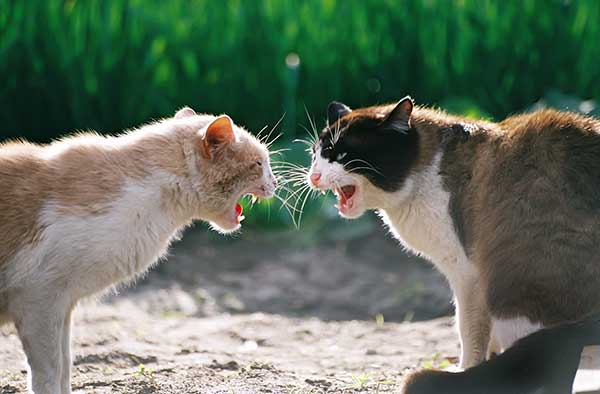
There are also instances where females give off pheromones suggesting that they’re on heat when they’re actually not receptive yet. Males picking up these pheromones will immediately go seeking out the female in order to mate with them. However, the still unreceptive female will try to fend off her potential suitors, resulting in a catfight.
Still on mating rights, it’s worth noting that some male and female cats may simply not get along. The female might be sexually receptive, alright. But she’ll avoid mating with a male if their chemistry doesn’t quite click. Of course, the male cat, now driven by powerful hormones, will want to force himself on the female. There can only be one outcome here – vicious fights.
Lastly, mating is not exactly a pleasurable experience for cats. That’s because the penis of a male cat contains barbed structures, which may hurt the female during penetration. If the female find the pain unbearable, she might fight back.
6. Inadequate Stimulation
This goes for both indoor and feral cats.
Cats that do not receive adequate exercise may have too much pent-up energy. They could release this energy on other cats during rough play or mock hunting.
What worsens the situation is the fact that cats sleep as much as two-thirds of their day. They then have numerous activities to fit into the remaining one-third, including eating, playing, and exercising.
- [Endless entertainment]: Migipaws cat ball toys suitable for indoor cats. Attach different accessories for a more interactive...
- [Motion activated]: its ball lights Up and starts Rolling in random directions as soon as it is touched, just like a small living...
- [Create a Distinctive and Entertaining Experience]: the toy allows you to attach accessories fluffy tail, small mice or your cat's...
Last update on 2025-02-07 / Affiliate links / Images from Amazon Product Advertising API
7. Underlying Medical Conditions
This is another catfight trigger that may happen to both indoor and stray cats.
Certain underlying conditions may cause cats to fight without sufficient provocation. Usually, the underlying illness is a behavioral or neurological disorder.
However, other common ailments like osteoarthritis may also escalate aggression. That’s especially if the sick cat fears other cats may bite or scratch him in the tender areas.
Understanding a Cat’s Body Language
We’ve gone through a number of reasons why catfights are common at night. Even so, you might still find yourself wondering, ‘why does my cat attack my other cat at night?’
Even before you familiarize yourself with the above-listed reasons, it’s important to begin by understanding the tell-tale signs that your cat is spoiling for a fight.
Cats have developed a complex communication system that includes their eyes, ears, body posture, and tail positioning, as well as vocalizations.
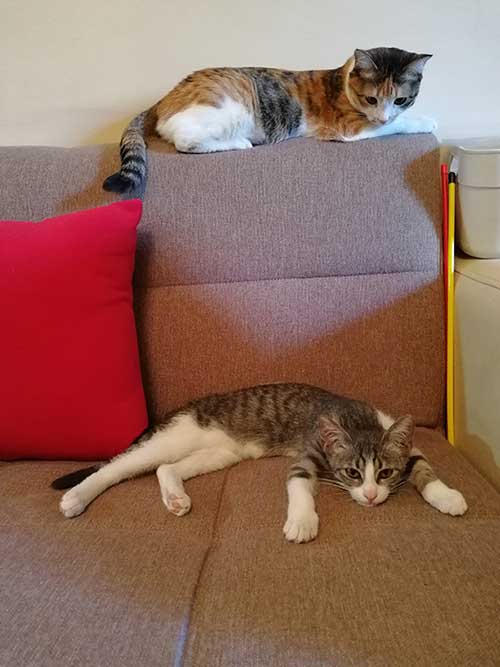
The following are some postures and cues that indicate aggression in cats;
- Dilated pupils – They’re nervous, submissive, or defensively aggressive.
- Ears pointed backward, sideways, or flattened – They’re likely angry, anxious, or frightened.
- Tail held low and tucked between their hind legs – They’re anxious or agitated.
- Arched back and piloerection – They’re angry or frightened.
- Growling and/or hissing – They’re angry, annoyed, frightened, or aggressive.
- Howling or yowling – They’re in pain, trapped, or otherwise distressed.
Should You Prevent Your Cat From Fighting At Night?
Before we answer this question, let’s pause for a moment and ask, do cats fight more at night?
The answer is a resounding yes, and for the obvious reason that cats are more active at night than during the day.
So, should you then prevent your cat from fighting at night?
Again, the answer is yes.
In fact, it doesn’t matter whether your cats fight more at night or during the day. You should prevent them from fighting at all.

Note that catfights can be quite vicious and may result in deep scratches and abscesses. If untreated, these abscesses might spread disease.
Injuries sustained from catfights may also rack up huge vet bills. And even if these fights don’t result in any worrying injuries, the mere vocalizations that cats make before and while fighting can be quite unsettling.
So, whichever way you look at it, it’s important to prevent cats from fighting.
Do Cats Fight to the Death?
Death from catfights may not come instantly. However, the deep wounds sustained and the resultant pain, inflammation, or infection might eventually take a toll on the injured cat’s health.
Some of the tell-tale signs that your cat was in a vicious fight include;
- Fever
- Decreased appetite
- Irritability
- Reduced energy levels
- Limping or incoordination
- Litter Box Enclosed Cabinet: A combination of litter box enclosure and modern cat tree, you can put litter box into this cabinet,...
- Multifunctional Intergraded Cat Tree: The 5 level platforms design provide different jumping heights for your cats to satisfy...
- Strong Practicality: Comes with a wooden cabinet, it can be used as both a cat's bathroom and a storage locker. When used as a...
Last update on 2025-02-07 / Affiliate links / Images from Amazon Product Advertising API
Why do cats scream when they fight?
The screaming and other vocalizations that cats make when they fight are mainly intended to scare off their opponents.
How Do I Stop My Cats From Fighting At Night?
The best way to stop cats from fighting at night (or any other time) is to find and address the root cause of the problem.
For instance, you may realize that your cat mostly gets into fights when on heat. Others will only get into fights over food, while mother cats will typically become aggressive while nursing.
The following are some effective tips to stop your cat from engaging in meaningless fights;
1. Go slow on routine changes
Routine changes, such as the change of address or home renovations, may cause cats to fight as each animal tries to assert his dominance in the new home.
So, if planning to move homes or perform a home makeover, it’s recommended to go slow on it to help your cats cope with the new changes.
View this post on Instagram
2. Neuter/Spay the cats
Male cats are naturally more aggressive than female cats. Their aggression stems from numerous causes, including territoriality and mating rights.
One way to make male cats less aggressive is to neuter them.
As for mother cats that tend to be overprotective of their young, spaying may help to prevent more litter. Ultimately, the female cat will become less aggressive as there’s no more litter to protect.
3. Offer the cat enough stimulation
Inadequate physical and mental stimulation is one of the primary causes of catfights. Therefore, giving your cat enough physical exercise may help tire him down and reduce his pent-up energy.
If your schedule doesn’t allow you to exercise your cat well enough, consider getting him enriching toys like interactive ball launchers to keep him stimulated in your absence.
- DOUBLE THE FUN FOR YOUR CAT - ORSDA 2in1 ambush interactive electronic cat toy has two fun ways to enjoy playtime! 1#The bright...
- RICH & REPLACEABLE ATTACHMENTS - Differ from other single-functional ambush feather cat toys, ORSDA cat feather toys add 4 types...
- AUTO ON-OFF & VARIOUS SPEED MODES - 3 customized modes with various speed suit for cats at any age! Built-in 10-minute automatic...
Last update on 2025-02-07 / Affiliate links / Images from Amazon Product Advertising API
4. Have multiple eating/drinking spots
No matter how well socialized, cats will almost always fight for food. The situation is usually worse where feral cats are involved.
The most effective solution to this problem is to have multiple eating and drinking spots. That way, the less dominant cats can always have safer places to eat and drink.
You might also consider designating separate sleeping and playing areas, as well as rooms where the submissive cats may retreat to if they feel threatened.
5. Use cat-appeasing pheromones
Spraying cat-appeasing pheromone products on furniture or around your home can help to reduce stress and anxiety among cats, thereby reducing aggressive behavior.
This tip will particularly help cats who are victims of fear aggression.
6. Make your home less appealing to stray cats
If your home keeps attracting feral cats, then there must be something special that these animals find appealing. In most cases, stray cats are attracted by an abundance of food.
To make your property less appealing, consider sealing off all trash cans so there’s nowhere feral cats can scavenge for food.
If it comes down to it, install motion-activated sprinklers to keep stray cats away.
View this post on Instagram
So, Why Do My Two Cats Fight At Night?
Various reasons could cause your cats to fight at night, ranging from dominance squabbles to play aggression, food aggression, fear aggression, and territoriality.
In rare cases, nighttime catfights could be triggered by an underlying medical condition.
Fortunately, there are numerous ways to stop or prevent your cats from getting into unnecessary fights at night.
Checkout Our Favorite Cat Products
1. Best Online Course For Cat Parents
Our favorite: The Cat Language Bible (How to Finally Understand And Speak to Your Cat) – A new form of cat to human communication that many cat owners have dreamed about… but few have actually thought possible.
2. Best Immune Support For Cats
Our favorite: Tomlyn Immune Support – Best Supplement for Cats and Kittens.
3. Best Cat Treats
Our favorites: LIFE ESSENTIALS All Natural Freeze Dried Chicken And Sheba Meaty Tender Sticks – Both are Great.

